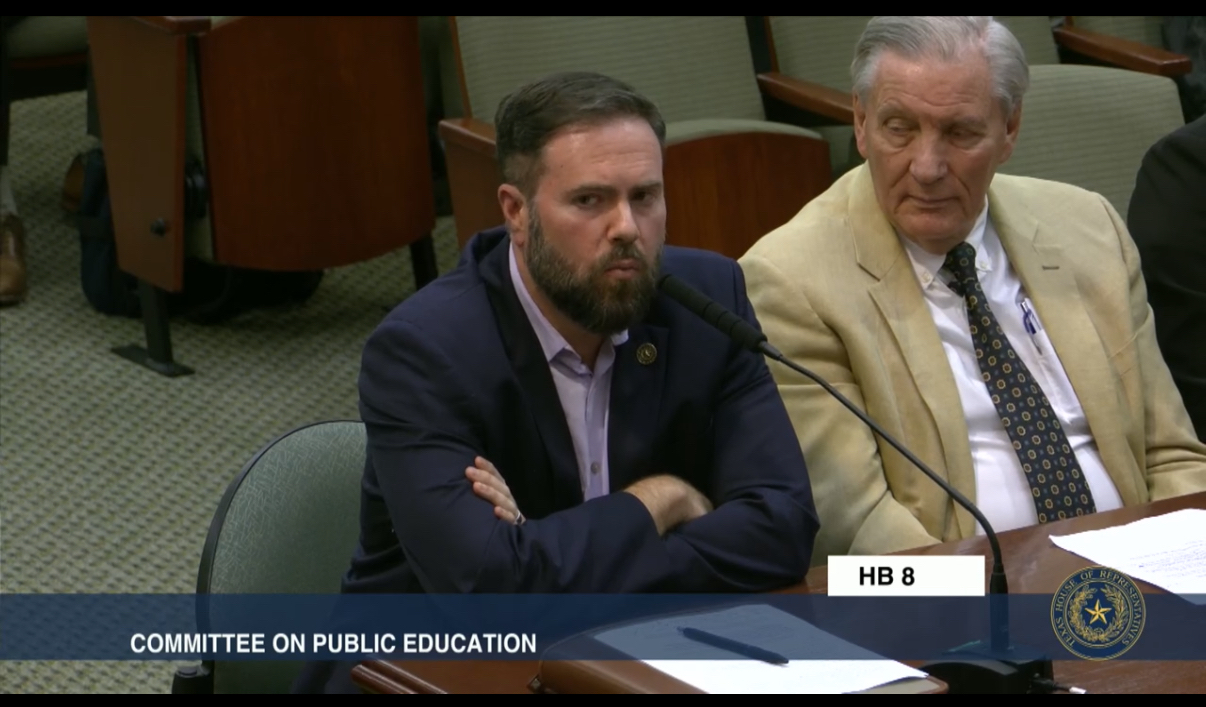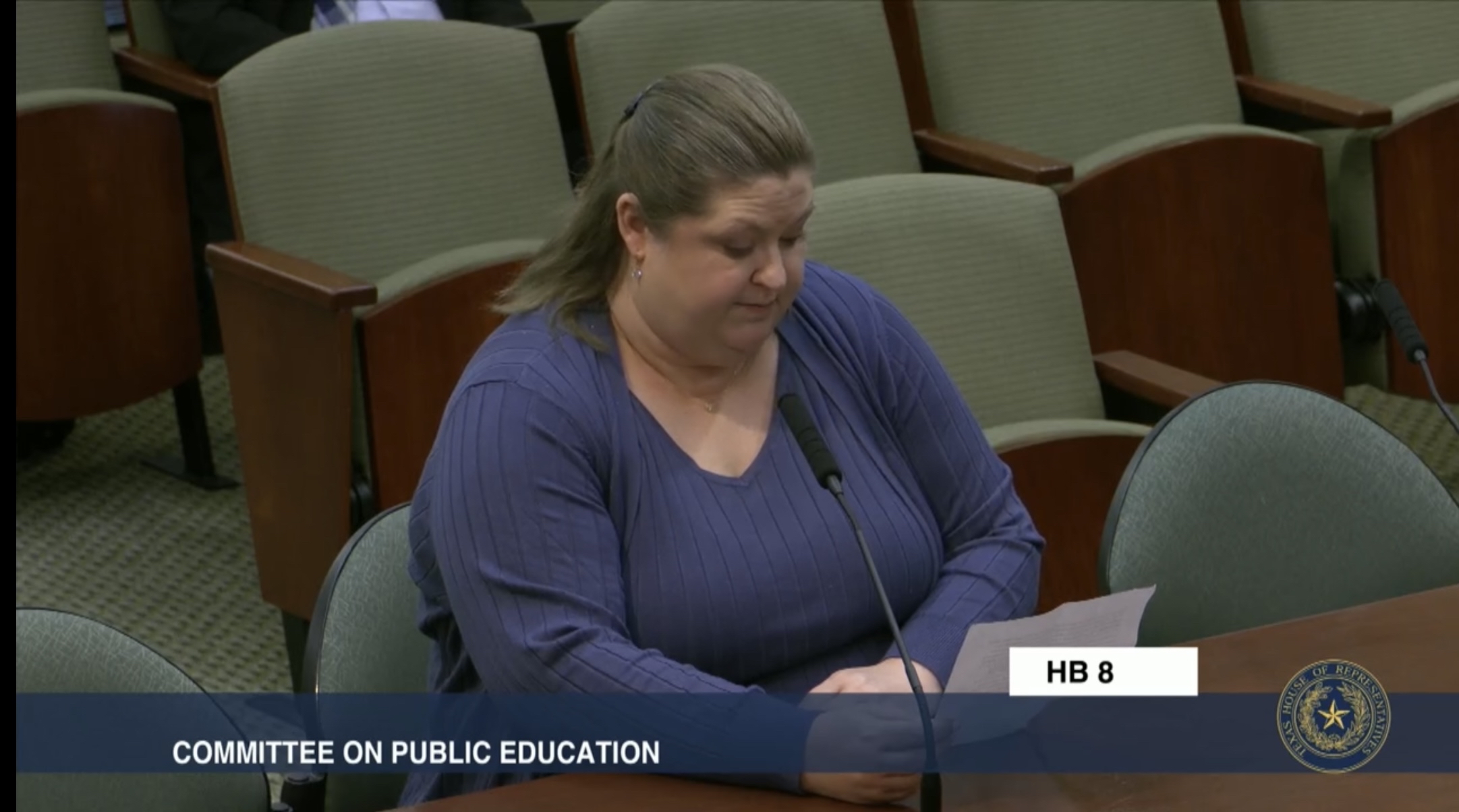House Public Education Committee advances testing and accountability bill

Date Posted: 8/22/2025 | Author: Tricia Cave
The House Public Education Committee met Thursday to consider House Bill (HB) 8 by Chairman Brad Buckley (R– Salado), the House’s testing and accountability bill. This bill is nearly identical to its Senate counterpart, Senate Bill (SB) 9 by Sen. Paul Bettencourt (R–Houston).
As drafted, the bills would:
- Go into effect in the 2027-28 school year, with the current STAAR test fully in place until then.
- Make through-year testing mandatory in grades 3-8 and optional in high school as an add-on to end-of-course exams (EOCs).
- Not eliminate any subjects currently being tested at any grade level.
- Give the commissioner of education significantly more authority over statewide testing and accountability. It would, however, place new time constraints on the commissioner regarding notification to districts regarding cut scores.
- Substantially curtails districts’ ability to challenge the commissioner on matters of accountability, including rankings and sanctions.
- Direct the Texas Education Agency (TEA) to create beginning- and middle-of-year tests (BOYs and MOYs), as well as establish a list of non-agency developed tests, such as MAP, that could be used to meet the BOY and MOY requirements. The non-agency BOY and MOY could be nationally norm-referenced tests. The end-of-year test (EOY) would be a more STAAR-like, agency-developed test.
- Split writing off from the remainder of the summative EOY to be administered during a separate fourth testing window.
Although the bill does specify that 85% of students should be able to complete the new tests in 60 to 90 minutes, depending on grade level and whether the test is a BOY/MOY test or an EOY test, it contains no new limit on the total amount of time available to take a test, as well as no indication that multiple subjects could or should be tested on the same day. There is also no new limit on the number of instructional days that can be devoted to administration of state tests. Together, this means that while individual tests would likely be shorter, the number of days devoted to state testing could increase by more than 300%. This would potentially be partially offset by an attempt to limit benchmark testing, especially in grades 3-8. However, as currently drafted, the language limiting benchmarks has a large, likely unintentional, loophole that if not fixed renders the prohibition nearly meaningless.
The hearing started off on a contentious note, with Rep. Gina Hinojosa (D–Austin) calling the bill “deeply disappointing” and questioning why the bill was changed so drastically from HB 4, also by Buckley, which was the House’s testing bill during the regular session. The House passed HB 4 143-1 in the regular session. Hinojosa expressed frustration, saying she believed HB 8 represented the House caving to the Senate. HB 8 is identical to the current Senate bill and very similar to SB 1962, Bettencourt’s testing and accountability bill from the regular session. The House refused to pass the Senate version of HB 4 in the regular session, which mirrored SB 1962, instead killing the bill in the conference committee.
The House Public Education Committee heard from two panels of invited testifiers during yesterday’s hearing, including TEA Commissioner Mike Morath. Rep. John Bryant (D–Dallas) was critical of Morath’s influence on the bill, as well as his job performance, pointing out that any issues with the current accountability system fall squarely at his feet and on his agency.
Hinojosa was also critical of the agency’s recent switch to using artificial intelligence to score writing samples. This has been in the news recently, with districts reporting that up to 30% of samples submitted for rescoring had been scored higher once reviewed by a human.
Many ATPE members completed a survey at the beginning of this special session, making your position clear: You do not want testing reforms unless they also come with the following:
- A pause on the punitive aspects of the accountability system (i.e., tying testing to jobs, school closures, and district takeovers) to allow educators, parents and lawmakers time to evaluate the efficacy of the new test and make any needed adjustments.
- A prohibition on benchmark testing if the new state accountability test is part of a multi-administration, through-year system of assessment so we are truly lowering the number of testing-related instructional interruptions, not increasing them.
- A commission of educators and parents to both assist in the design of any new assessment and to study and propose reforms to the accountability system prior to the start of the next regular session.


ATPE Governmental Relations Director Monty Exter testified on the bill, sharing the thoughts and feelings of our members with the committee. He explained that whether it was the intention of the committee or not, our members and the public at large do not see this legislation as “ending the STAAR test.” He explained that while ATPE was ultimately very supportive of HB 4 during the regular session, ATPE members responded that they believed through-year testing would increase, not diminish, the testing burden. They also have concerns about using a diagnostic exam (BOY and MOY) for accountability purposes, and they have concerns about shifting from local control to commissioner control. Exter explained that while the conversations around the bill have been about the testing system, it is the accountability system that truly needs work. He reiterated ATPE’s request for a pause in punitive accountability measures as well in order to allow for adjustments due to the implementation of such a huge change to the testing system.
ATPE Lobbyist Tricia Cave also testified, reading a sample comment from one of our members that encapsulated some of the thoughts Exter had expressed.
ATPE also submitted written testimony.
As expected, the bill was passed out of committee at the end of the hearing by a vote of 8-1, with six members absent for the vote. It now heads to the House floor.
CONVERSATION
RECOMMENDED FOR YOU

02/16/2026
SBEC finalizes rules to comply with new Texas legislation passed in 2025
The State Board for Educator Certification met Feb. 13, 2026, to adopt final rules affecting educator certification and discipline.

02/13/2026
Teach the Vote’s Week in Review: Feb. 13, 2026
Early voting for the March primary election begins Tuesday, Feb. 17, and runs through Friday, Feb. 27.

02/06/2026
Teach the Vote’s Week in Review: Feb. 6, 2026
A special election runoff in Texas Senate (SD) 9 results in a dramatic party flip in a Republican stronghold.


*Oops. I meant the 90th. 🙃
Thank yall for your work. These bills shouldn’t pass during Special and a Commission should take months to study/create a good bill that most can support in the 89th. Whatever we get we’ll have for a LONG time, so we have to get it right.